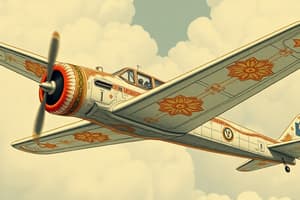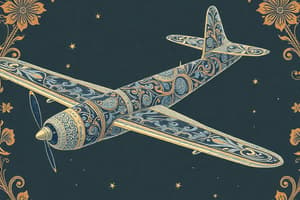Podcast
Questions and Answers
Designators may have as many as ___ characters, but no less than ___
Designators may have as many as ___ characters, but no less than ___
4;2
The first character in an aircraft designation must be a?
The first character in an aircraft designation must be a?
letter
What defines Category I aircraft?
What defines Category I aircraft?
Small aircraft weighing 12,500 lbs or less, single-engine, prop-driven, all helicopters
What defines Category II aircraft?
What defines Category II aircraft?
What defines Category III aircraft?
What defines Category III aircraft?
Define the small weight class.
Define the small weight class.
Define the large weight class.
Define the large weight class.
Define the heavy weight class.
Define the heavy weight class.
What are the operating characteristics of CAT I?
What are the operating characteristics of CAT I?
What are the operating characteristics of CAT II?
What are the operating characteristics of CAT II?
What are the operating characteristics of CAT III?
What are the operating characteristics of CAT III?
What defines helicopters in terms of operating characteristics?
What defines helicopters in terms of operating characteristics?
What are the nine aircraft identifiers?
What are the nine aircraft identifiers?
Where can the engine be located on an aircraft?
Where can the engine be located on an aircraft?
All jets are Category __ aircraft.
All jets are Category __ aircraft.
What are the three wing placements?
What are the three wing placements?
What are the three wing configurations?
What are the three wing configurations?
What are six tail configurations?
What are six tail configurations?
What are the three basic types of landing gears?
What are the three basic types of landing gears?
Study Notes
Aircraft Designators
- Aircraft designators can range from 2 to 4 characters.
- The first character in a designation must always be a letter.
Aircraft Categories
- Category I: Small aircraft under 12,500 lbs, including single-engine prop-driven and all helicopters.
- Category II: Small aircraft under 12,500 lbs with twin-engine prop-driven configurations.
- Category III: Large aircraft, specifically multi-engine turbojets.
Weight Classes
- Small Weight Class: Aircraft with a maximum certified takeoff weight of 41,000 lbs or less.
- Large Weight Class: Aircraft weighing more than 41,000 lbs but not exceeding 300,000 lbs in maximum certified takeoff weight.
- Heavy Weight Class: Aircraft capable of takeoff weights exceeding 300,000 lbs, regardless of current operating weight.
Operating Characteristics by Category
- CAT I: Operates at altitudes up to 10,000 ft MSL, speeds from 100 to 160 knots, and a climb rate of 1,000 ft/min or less.
- CAT II: Operates at FL240 and below, speeds ranging from 160 to 250 knots, with a climb rate of 1,000 to 2,000 ft/min.
- CAT III: Operates at FL450 and below, speeds between 300 and 550 knots, with a climbing capability of 2,000 to 4,000 ft/min.
Helicopter Operations
- Helicopters typically operate below FL200, at speeds ranging from 90 to 160 knots, and climb rates from 500 to 2,150 ft/min.
Aircraft Identifiers
- Nine identifiers that classify aircraft include size, engine location, engine type, wing placement, wing configuration, tail configuration, window style, fuselage shape, and landing gear type.
Engine Location
- Engine placement can be on the wings, vertical stabilizer, or fuselage.
Jets Category
- All jet aircraft are classified as Category III.
Wing Placements and Configurations
- Wing Placements: High-wing, mid-wing, low-wing.
- Wing Configurations: Straight, swept, delta.
Tail Configurations
- Six configurations include conventional, forward slant vertical stabilizer, horizontal stabilizer above fuselage, 't'-tail, 'v'-tail, and 'twin boom'-tail.
Landing Gear Types
- Three main types of landing gears are tricycle, conventional, and tandem.
Studying That Suits You
Use AI to generate personalized quizzes and flashcards to suit your learning preferences.
Description
Test your knowledge on aircraft categories, weight classes, and designators with this quiz. From understanding the character limits for designators to the classifications of small aircraft, this quiz covers essential aviation terminology. Perfect for aviation students and enthusiasts alike!




